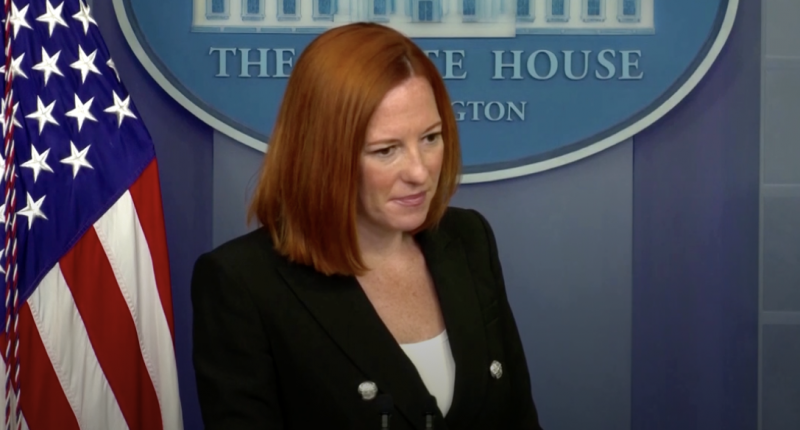- The Biden Administration extends its border closure with Canada and Mexico through to August 21 as the countries continue to fight COVID-19
- The extension comes even as Canada announces it will open its borders to non-essential travel from April 9
- The highly contagious Delta variant accounts for around 83 per cent of current US coronavirus cases as vaccines are rolled out across the country
- White House press secretary Jen Psaki says the country relies on advice from “health and medical experts, not on the actions of other countries”
- Travel restrictions between the US, Mexico, and Canada have been extended every month since they were first introduced in March last year
The Biden Administration has extended its border closure with Canada and Mexico through to August 21 as the countries continue to fight COVID-19.
The restrictions ban travel for non-essential reasons — such as tourism — between the States and its neighbours to the north and south.
Travel was first suspended in March 2020 in the early days of the coronavirus pandemic. Borders were slated to open on Thursday this week, 16 months after they closed, but travel restrictions have now been extended by an extra 30 days.
The US Department of Homeland Security said it would work to ensure the continued flow of essential trade and travel between the nations.
The news comes just a day after Canada announced it would be welcoming fully vaccinated US travellers from August 9.
Proof of vaccination and COVID-19 testing will be required for travellers to Canada, but travel will be permitted for non-essential reasons.
Nevertheless, White House press secretary Jen Psaki said any decisions the Biden Administration makes were based on health advice from experts.
“We rely on the guidance of our health and medical experts, not on the actions of other countries,” Ms Psaki said.
The restrictions bar non-essential travel completely via land or ferry from surrounding countries to the US, though travellers from Canada and Mexico can still fly into the States so long as they provide proof of a negative COVID-19 test or of recovery from the virus.
Delta variant spreading as vaccines roll out
Though coronavirus vaccines are still being rolled out across the US, the highly infectious delta variant of COVID-19 is causing a renewed surge in infection rates in many places around the world.
The United States Centre for Disease Control (CDC) said this week the Delta variant currently accounted for around 83 per cent of all coronavirus cases in the country.
To decrease the spread of COVID-19, including the Delta variant, the United States is extending restrictions on non-essential travel at our land and ferry crossings with Canada and Mexico through August 21, while ensuring the continued flow of essential trade and travel.
— Homeland Security (@DHSgov) July 21, 2021
The department added that it was in “constant contact” with its Canadian and Mexican counterparts to work out conditions under which travel restrictions could be eased.
Though the border rules have been extended through to August 21, there is no guarantee that travel will open once more on this date — travel restrictions have been extended on a month-by-month basis since they were first introduced last year.
However given the uptake in vaccinations and the relaxing Canadian rules, this could mark the final extension.
CEO of the Canadian Chamber of Commerce Perrin Beatty criticised the latest US travel extension, saying it flew in the face of “both science and the most recent public health data”.
“It’s hard to see how allowing fully vaccinated Canadians to enter the US poses a public health threat when travel within the US is unrestricted,” Mr Beatty said.
The US has recorded around 35 million cases of COVID-19 and over 625,000 deaths from the virus.
It’s estimated that around 56 per cent of the country’s population has had at least one vaccine dose, while 49 per cent are completely inoculated.







